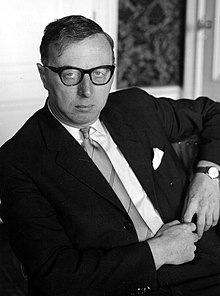Jelle Zijlstra
Jelle Zijlstra (born August 27, 1918 in Oosterbierum, today to Franekeradeel , † December 23, 2001 in Wassenaar ) was a Dutch economist and politician of the Anti-Revolutionaire Partij (ARP). From 1966 to 1967 he was Prime Minister of a transitional cabinet. From 1967 to 1981 Jelle Zijlstra was President of De Nederlandsche Bank , the central bank of the Netherlands. In 1983 he was given the honorary rank of Minister of State .
biography
Jelle Zijlstra was born in Oosterbierum in 1918 as the son of the farmer and grain trader Ane Zijlstra and his wife Pietje Postuma. In 1937 he began studying economics at the University of Rotterdam . At the university he joined the student fraternity Societas Studiosorum Reformatorum Roterodamensis , of which he became chairman. Because of the beginning of the Second World War and the subsequent occupation of the Netherlands by the German Empire, Zijlstra was forced to interrupt his studies several times. In order to avoid working in Germany, he lived underground in Friesland for some time. After the end of the war, he was able to finish his studies in November 1945, followed by a doctorate in economics in 1948. He then received a professorship at the newly established business faculty of the University of Amsterdam .
After joining the Christian Democratic party ARP at a young age , he began to be more politically active and was appointed to the Sociaal-Economische Raad , which advises government and parliament on socio-economic issues. After the parliamentary elections in 1952 , the ARP became part of the new coalition government and Zijlstra was awarded the post of Minister of Economics . In this position, he advocated greater regulation of the Dutch economy, even though it was in a growth phase at the beginning of his tenure. After the parliamentary elections of 1956 , he remained Minister of Economics in the newly formed cabinet under Prime Minister Willem Drees . Furthermore, Zijlstra was from now on the group chairman of the ARP in the Second Chamber of the States General . After the overthrow of this government coalition, from December 1958 to May 1959 he headed the economics and finance department of the transitional government. Following the new elections that followed, he gave up both the chairmanship of his party and the Ministry of Economic Affairs and from then on only worked as finance minister.
In 1962, due to tensions within the ARP, Zijlstra announced that he would not run again for a mandate for the Second Chamber. In addition to some activities outside of politics - including an associate professor of public finance at the University of Amsterdam - he held a seat in the First Chamber of Parliament between 1963 and 1966 . In 1966, after the breakup of the current government coalition, Zijlstra was entrusted with the formation of a transitional cabinet. Between November 22, 1966 and April 5, 1967, he was Prime Minister and Minister of Finance in personal union in front of a minority government.
After the end of his interim term as Prime Minister, Zijlstra was appointed director of the Dutch central bank in May 1967, a post he held until 1981. During this time, Zijlstra was, among other things, largely responsible for linking the Dutch guilder to the rate of the German mark in the 1970s. After his retirement, the future King Willem-Alexander appointed him Minister of State of the Netherlands. Jelle Zijlstra finally died on December 23, 2001 in Wassenaar, South Holland.
Awards
literature
- Jonne Harmsma: Jelle zal wel zien: een idiosyncratic leven tussen politiek en economie . Ed .: Rijksuniversiteit Groningen. Uitgeverij Prometheus, Groningen 2018, ISBN 978-90-446-3535-5 .
Web links
- Biography of Zijlstras at huygens.knaw.nl (Dutch)
- Dr. J. (Jelle) Zijlstra at Parlement & Politiek (Dutch)
Individual evidence
- ^ Jan Postma: Jelle Zijlstra. Economische wetenschap as a politieke power factor. In: biografieportaal.nl. December 7, 2018, accessed August 30, 2019 (Dutch).
- ↑ harde-guldenbeleid. In: dfbonline.nl. De Finacielle begrippenlijst, accessed on August 30, 2019 (Dutch).
- ↑ List of all decorations awarded by the Federal President for services to the Republic of Austria from 1952 (PDF; 6.6 MB)
| personal data | |
|---|---|
| SURNAME | Zijlstra, Jelle |
| BRIEF DESCRIPTION | Dutch economist and politician (ARP, Prime Minister 1966–1967) |
| DATE OF BIRTH | August 27, 1918 |
| PLACE OF BIRTH | Oosterbierum |
| DATE OF DEATH | December 23, 2001 |
| Place of death | Wassenaar |

